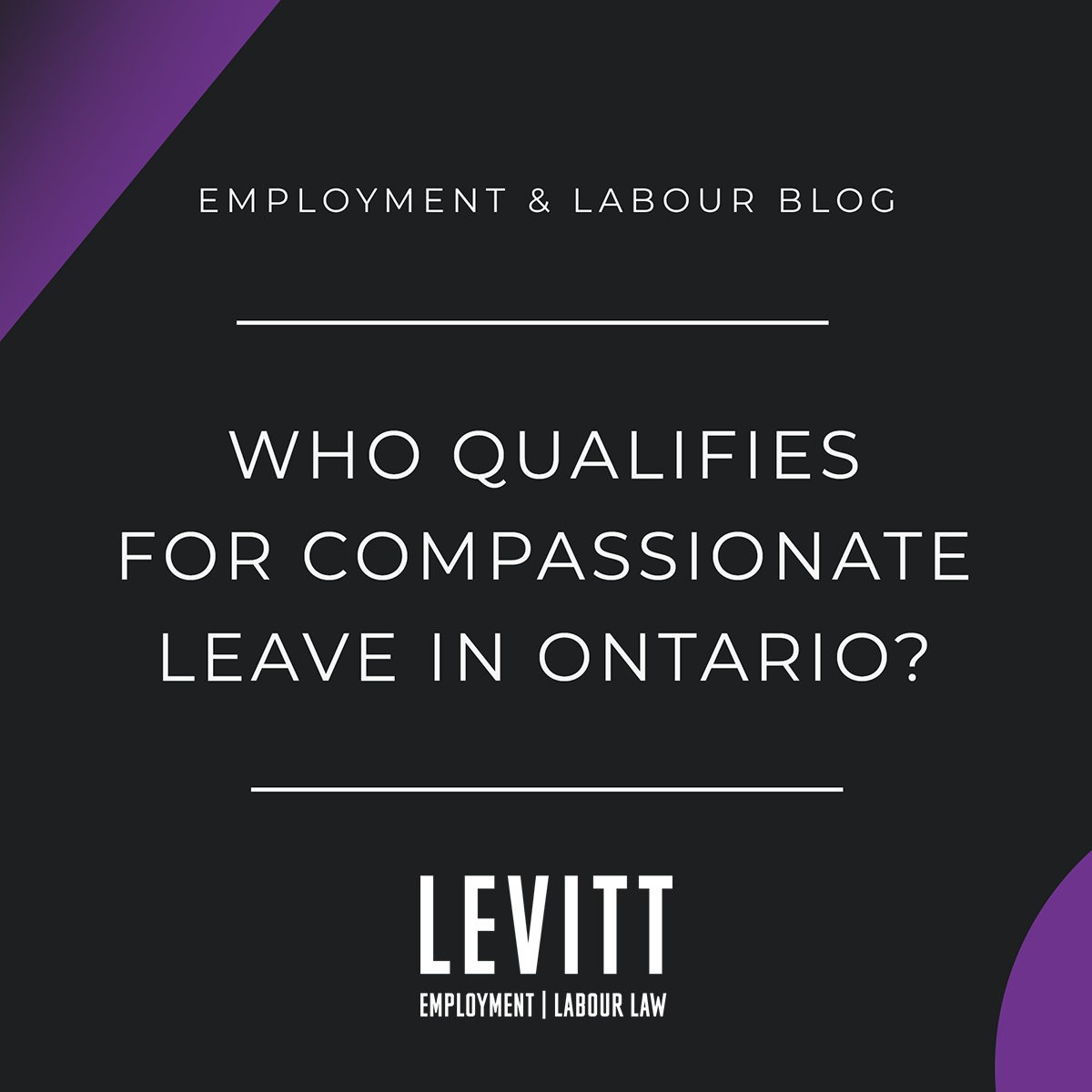What is Compassionate Leave?
Compassionate leave is granted to employees who need to provide care or support to family members and people who the employee considers to be like a family member who have a serious medical condition.
“Care” or “Support” include providing psychological or emotional support; arranging for care by a third party provider; or directly providing or participating in the care of the family member.
There are three types of compassionate leave under the Employment Standards Act, 2000 (ESA): (1) Family Medical Leave, (2) Family Caregiver Leave, and (3) Critical Illness Leave, which will be explored in more detail below.
Is Compassionate Leave Paid?
No, compassionate leave is a form of unpaid, job-protected leave under the Employment Standards Act, 2000 or the Canada Labour Code (CLC).
Who Qualifies for Compassionate Leave?
All employees, whether full-time, part-time, permanent, or term contract, who are covered by the ESA are entitled to all forms of compassionate leave. There is no requirement that an employee be employed for a particular length of time, or that the employer employ a specified number of employees in order for the employee to qualify for family medical leave.
This is also the case for federally regulated employees.
Eligibility Criteria for Compassionate Leave under the Employment Standards Act
Family Medical Leave and Family Caregiver Leave
Under the Employment Standards Act, up-to 28 weeks of unpaid leave in a 52-week period may be taken for Family Medical Leave and Family Caregiver Leave. Leave is available to all employees who are covered by the ESA, including full-time, part-time, permanent, or term contract.
The difference between Family Medical Leave and Family Caregiver Leave is that to qualify for Family Medical Leave, an employee must be caring for or supporting a family member who has a serious medical condition AND a significant risk of death occurring within a period of 26 weeks.
Critical Illness Leave
Employees are also entitled to Critical Illness Leave under the Employment Standards Act, which can be used to take care of an adult or minor child who is a family member. Critical Illness Leave may be taken for up to 17 weeks to care for an adult and up to 37 weeks to care for a minor child.
Does taking on leave preclude me from taking others?
No, Family Medical Leave, Family Caregiver Leave, and Critical Illness Leave are different. Taking one form of leave does not preclude you from taking another. An employee is allowed to take more than one leave for the same event.
Eligibility Criteria for Compassionate Leave under the Canada Labour Code
Similar to provincially regulated employees, federally regulated employees are entitled to Compassionate Care Leave and Critical Illness Leave Compassionate Care Leave
Federally regulated employees can take up to 28 weeks of unpaid compassionate care leave within a 52-week period to look after a family member who has a serious medical condition with a significant risk of death. This leave begins during whichever occurs first:
- The week the health care practitioner signs the medical certificate;
- The week the health care practitioner examines the gravely ill family member; or
- The week the family member becomes gravely ill, of the healthcare practitioner can determine that date (for example, the date of the test results)
The leave ends when:
- The 28 weeks of compassionate care are complete;
- The gravely ill family member dies or no longer requires care or support; or
- The 52-week period expires.
Critical Illness Leave
Employees covered under the CLC who care for a critically ill adult or child who is a family member is eligible to take up to 37 weeks of leave in a 52-week period to provide care or support for a child under 18, and up to 17 weeks of leave in a 52-week period to provide care or support to an adult.
What Benefits am I Entitled to While on Compassionate Leave?
“Caregiving Benefits” Under Employment Insurance (EI)
There are three types of paid caregiving benefits employees can access under employment insurance:
- Family caregiver benefit for children (person under 18);
- Family caregiver benefit for adults (persons over 18); and
- Compassionate care benefits, which includes a person of any age who requires end-of-life care.
The family caregiver benefit for children is payable up to a maximum of 35 weeks, the adult caregiver benefit up to 15 weeks, and the compassionate care benefit up to 26 weeks.
“Compassionate Care Benefits” Under the Federal Employment Insurance Act (EIA)
Under the federal Employment Insurance Act, six weeks of employment insurance benefits (called “compassionate care benefits“) may be paid to EI eligible employees who have to be away from work temporarily to provide care to a family member who has a serious medical condition with a significant risk of death within 26 weeks and who requires care or support from one or more family members.
The right to take time off work under the family medical leave provisions of the ESA is not the same as the right to the payment of compassionate care benefits under the federal Employment Insurance Act. An employee may be entitled to family medical leave whether or not he or she has applied for or is qualified for the compassionate care benefits.
Please note that this article is only to be used as general information and it does not constitute legal advice. We encourage employees and employers to contact Levitt LLP directly to understand provincial employment contracts better and seek legal advice to their questions.

